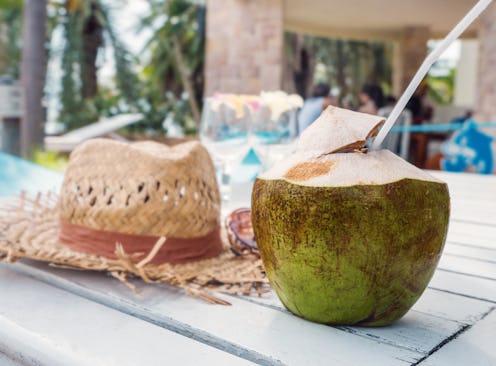Life
Where Does Coconut Water Come From?
In case you haven't heard, coconut water is the latest health craze to sweep the nation — but, uh, where does coconut water come from? It promises a slew of benefits, including hydrating your body, curing hangovers, and helping with kidney stones. In fact, apparently people have gone so far as to market it as "Mother Nature's Sports Drink." I feel like we're about one step away from the "gives you wings" promises of Red Bull. And yet, there are a few facts about this magical cure-all you probably don't know.
It's no secret that people are going absolutely nuts for coconut water (pun intended). You've probably seen the many Instagram snaps — from celebrities, athletes, and regular Joes alike — toting their bottle of coconut water to the gym for their afternoon workout. Personally, I can understand our need to jump on every health bandwagon that comes our way. I myself become a little bit more obsessive about my health when summer rolls around, and hydration becomes key. That's why I set out to learn a little bit more about this mysterious coconut water, where it comes from, and what it actually does for your body. So, let's jump right in and answer some common questions about this sweet — and supposedly powerful — drink.
1. Where does it come from?
Quite simply, coconut water is a clear liquid that is tapped from the center cavity of coconuts when they're still young and green. As the coconut ages, that clear liquid solidifies and turns into the white meat that you're used to seeing inside of the fruit.
2. Is coconut milk the same as coconut water?
No, coconut milk and coconut water are actually quite different. While coconut water comes from the center of young coconuts, coconut milk comes from the flesh of the fruit. That white pulp of the coconut is grated and then pressed through a filter to extract the milk.
There's also a large difference in nutritional value between the two. Coconut milk is much higher in both fat and calories than coconut water. A cup of coconut milk is right around 500 calories, while a cup of coconut water is only 45 calories. Similarly to coconut water, the milk of coconuts does offer potassium, protein, and many vitamins. However, all of these benefits are pretty much outweighed by the high calories and saturated fat counts.
3. What's so great about coconut water?
Coconut water contains potassium, which is a mineral that helps to balance your body's fluids after exercise. In fact, a study put together by Medicine & Science in Sports & Exercise found that coconut water can hydrate you better than regular water. So, it's a great way to stay hydrated, especially if the yummy taste encourages you to take in more fluids.
Additionally, many of us don't get enough potassium in our daily diets — yet another reason to eat your fruits and veggies — and coconut water can help to fill in that gap and add more of the mineral to your diet.
However, there's no scientific backing that coconut water can help with the ever-growing list of ailments you've seen promoted. So, don't anticipate that the sweet liquid will boost your metabolism or cure cancer. It's simply just another way to hydrate.
4. What kind of coconut water should I buy?
If you want to give coconut water a try, go for it! Make sure that you look for versions that are unsweetened, so you aren't just pumping your body full of a high-calorie, sugary drink. Also check that the bottle says "100 percent coconut water" to ensure you aren't getting a diluted knock-off.
